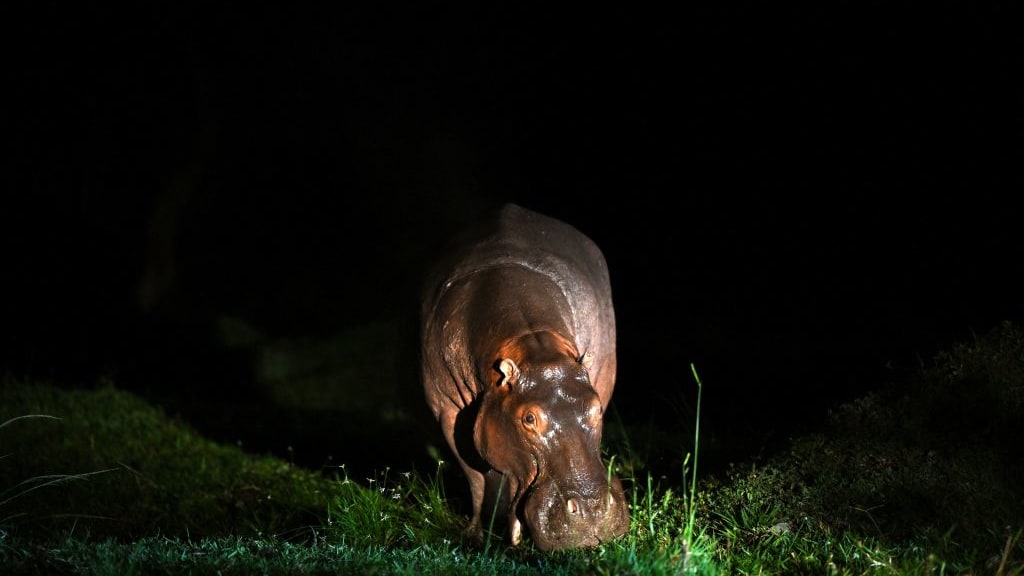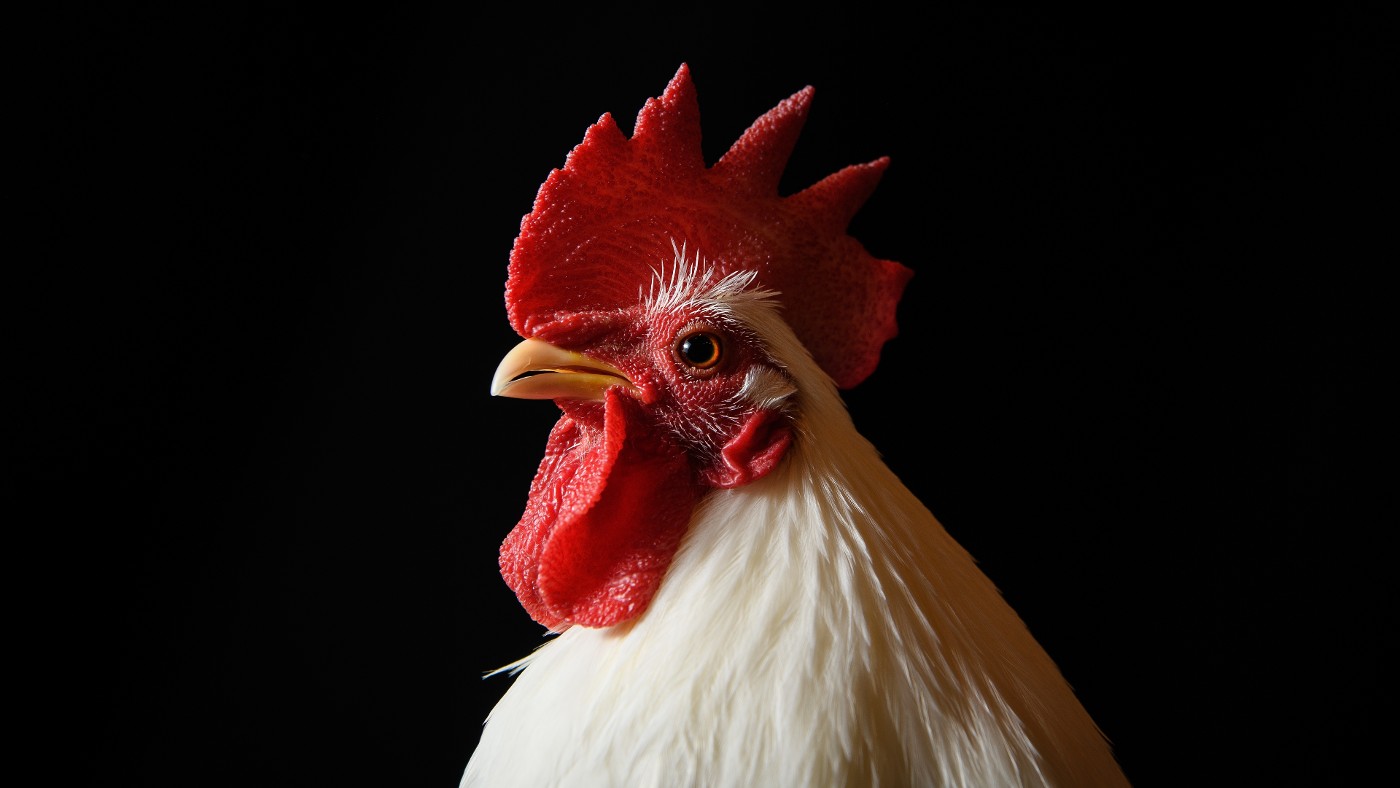Colombia's 'cocaine hippos': A problem too big to ignore
Descendants of four hippos that once belonged to drug kingpin Pablo Escobar are wreaking havoc on the country


A free daily email with the biggest news stories of the day – and the best features from TheWeek.com
You are now subscribed
Your newsletter sign-up was successful
A motorist slammed into a hippopotamus last month on a rural highway in Colombia. Though the driver walked away unharmed, his SUV and the 2,000-pound animal were totaled and killed, respectively. The unusual accident — the first of its kind in a South American nation where hippos aren't native — was just the latest sign that Colombia's so-called "cocaine hippos" are becoming a big problem.
What are hippos doing in Colombia?
The hippo that died on the highway was a descendent of four specific hippos — one male and three females — that the notorious cocaine kingpin Pablo Escobar imported for his private zoo in the 1980s. After Escobar died in a 1993 shootout with police in Medellin, the government seized his 7,400-acre Hacienda Napoles ranch, which has since been transformed into a theme park, and transferred most of the animals to other zoos. The hippos, however, were left to roam freely in a hot, marshy area.
Why is that a problem?
Well, the four hippos multiplied. Since Escobar's death, the hippo population in Colombia has exploded to more than 140. "It is the biggest hippo herd outside Africa, which is their native region," veterinarian and conservationist Carlos Valderrama told BBC. The country has since classified the "cocaine hippos" as an invasive species. Studies have also concluded that they are damaging the ecosystem in the Magdalena River, the largest river in one of the world's most biodiverse countries. Indeed, each animal eats about 90 pounds of grass nightly, prompting a barrage of excrement that then poisons the water, kills fish, and threatens everything else that lives in or drinks the H2O.
The Week
Escape your echo chamber. Get the facts behind the news, plus analysis from multiple perspectives.

Sign up for The Week's Free Newsletters
From our morning news briefing to a weekly Good News Newsletter, get the best of The Week delivered directly to your inbox.
From our morning news briefing to a weekly Good News Newsletter, get the best of The Week delivered directly to your inbox.
So is this affecting humans?
Yes, and not just because the animals pose a danger when they wander into highways. Hippos are territorial and at times quite aggressive, killing about 500 people annually. In Colombia, there have been at least two maulings in recent years. Farmworker Javier Díaz suffered three cracked ribs and a broken leg and collarbone when a hippo attacked him two years ago. "The hippo tossed him in the air as if he were a ball," his employer, cattle rancher Juan Cadavid, told The Wall Street Journal. In a separate instance, fisherman Álvaro Molina hit a hippo in the Magdalena River and it flipped his boat, forcing him to swim to shore. Illegal traffickers have also begun capturing and selling the animals, adding another layer of danger to the equation.
Can't people simply avoid the hippos?
For now, maybe. But Colombian biologist Nataly Castelblanco-Martínez has pointed out that since hippos aren't native to Colombia, they have no natural predators in their new and ever-expanding stomping grounds (they have to contend with lions and crocodiles in Africa) and can therefore reproduce easily, with each female capable of giving birth every two years. "If we don't do anything, 20 years from now, the problem will have no solution," she said. In a study published in the journal Nature in 2021, Castelblanco-Martínez and other experts estimated that the hippo population would grow to 1,400 as soon as 2034 unless 30 of the animals are removed from the breeding pool every year.
So is that what the government is doing?
Yes, but castrating an unpredictable 4,000-pound semiaquatic beast isn't as easy as it sounds. Cristina Buitrago, a veterinarian for Cornare, a state-sponsored environmental group, has worked with a six-person team that lures hippos in with 180 pounds of carrots, knocks them out with darts carrying enough sedative to down three horses, and then flips their massive bodies to perform a castration. The five-hour operation can "cost up to $17,000 in a country that struggles to finance health care for humans," the Journal says. So far, the team has "fixed" 11 males and two females. "It's dirty. There's mud everywhere. You're soaked in sweat," Buitrago said. "This is not a practical way to solve the problem."
What about culling them?
The government has tried that, too, having hired a big-game sharpshooter in 2009. The hunter, escorted by members of the military, even killed one of Escobar's original animals. But when photos of soldiers posing with the bloody carcass circulated, the public blew a gasket. Fans started calling the animal "Pepe," and the outrage fueled street protests and a "save the hippos" campaign. In 2012, a judge banned hippo hunting.
A free daily email with the biggest news stories of the day – and the best features from TheWeek.com
Is there any other way to control the population?
Cornare has tried a new approach over the last two years — it now uses a dart rifle to administer a U.S.-provided chemical contraceptive called GonaCon. In 2022, the group shot the drug into 38 hippos, though it isn't sure which exactly, seeing as the hippos have managed to remove paint, collars, and other markers used to identify them. The group will next try tattoo ink, but even that won't be a total fix, The Washington Post reports. "Tracking them down is a titanic task," said David Echeverri of Cornare.
So ... these hippos have the run of Colombia?
There is still hope of getting things under control. Indeed, authorities in Columbia's Antioquia Department have committed to catching 70 of the hippos, which they can't send to Africa for fear the animals will spread new diseases to the continent. Instead, the plan is to fly 60 of the hippos to the Greens Zoological Rescue and Rehabilitation Center in Gujarat, India, and the rest to the Ostok Sanctuary in Mexico. More could go to Ecuador, the Philippines, and Botswana later. But the undertaking won't be easy or cheap, at a total estimated cost of $3.5 million. Each individual animal will need a special crate costing up to $10,000. Keeping them healthy will cost another $2,500 per month. And a charter flight to India on a cargo plane owned by Belarus' Rada Airlines, with room for 20 to 30 hippos, will cost $900,000; the trip to Mexico, $400,000. But it's worth it, said regional government spokesperson Lina de los Ríos, to have this "valuable strategy to preserve these animals, as we don't believe their extermination is the right solution."
Harold Maass is a contributing editor at The Week. He has been writing for The Week since the 2001 debut of the U.S. print edition and served as editor of TheWeek.com when it launched in 2008. Harold started his career as a newspaper reporter in South Florida and Haiti. He has previously worked for a variety of news outlets, including The Miami Herald, ABC News and Fox News, and for several years wrote a daily roundup of financial news for The Week and Yahoo Finance.
-
 The Olympic timekeepers keeping the Games on track
The Olympic timekeepers keeping the Games on trackUnder the Radar Swiss watchmaking giant Omega has been at the finish line of every Olympic Games for nearly 100 years
-
 Will increasing tensions with Iran boil over into war?
Will increasing tensions with Iran boil over into war?Today’s Big Question President Donald Trump has recently been threatening the country
-
 Corruption: The spy sheikh and the president
Corruption: The spy sheikh and the presidentFeature Trump is at the center of another scandal
-
 Mouse keeps tidying up man's shed
Mouse keeps tidying up man's shedTall Tales And other stories from the stranger side of life
-
 Mystic's 'terrifying' 2024 predictions
Mystic's 'terrifying' 2024 predictionsTall Tales And other stories from the stranger side of life
-
 White Easter more likely than a white Christmas
White Easter more likely than a white ChristmasTall Tales And other stories from the stranger side of life
-
 Middle-class chickens pampered at 'hotels'
Middle-class chickens pampered at 'hotels'Tall Tales And other stories from the stranger side of life
-
 10 things you need to know today: October 22, 2023
10 things you need to know today: October 22, 2023Daily Briefing Israeli planes strike Gaza and West Bank as war intensifies, US pressing United Nations to draft Israeli self-defense resolution, and more
-
 Is the 'vibecession' over?
Is the 'vibecession' over?Speed Read The IMF reported that the global economy is looking increasingly resilient. Is it time to start celebrating?
-
 The U.S. veterinarian shortage crisis
The U.S. veterinarian shortage crisisSpeed Read With an anticipated shortage of 15,000 vets by 2030, it will be harder to get care for pets
-
 Inside Russia's war crimes
Inside Russia's war crimesSpeed Read Occupying forces in Ukraine are accused of horrific atrocities. Can they be held accountable?
